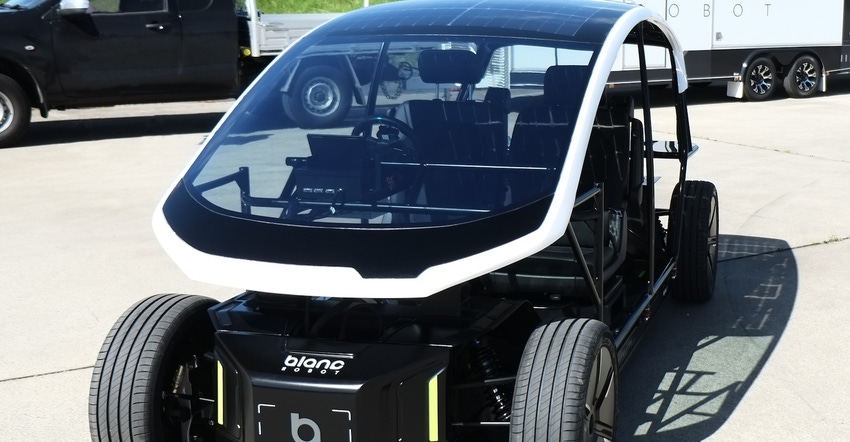Teijin Team Develops Polycarbonate Solar Roof for Future Mobility
The range extender for electric vehicles also delivers a lightweight footprint.
March 3, 2021

Teijin Ltd. and partner Applied Electric Vehicles (Applied EV) have developed a polycarbonate (PC) solar roof for future mobility applications. The green solution marks another major step toward the companies’ shared vision of zero-emission mobility.
The new solar roof uses Teijin’s Panlite PC resin glazing for its surface. Teijin used its proprietary know how in PC glazing and technologies to integrally mold the roof’s curved surface into an ideal shape, an extremely challenging process when using glass. Not only is the Panlite glazing roof ideally shaped, it achieves the strength and rigidity required for the application.
Conventional PC offers excellent impact resistance, but it must be specially processed to realize the level of weather resistance needed for long-term outdoor use. Teijin’s Panlite glazing, however, can easily be given a proprietary hard coating to achieve the 10-year weather durability required for automobiles.
Teijin and Applied EV deployed the solar roof on a prototype EV passenger pod installed on the Blanc Robot, a zero-emission robotic vehicle platform developed by Applied EV using materials and technical support from Teijin. In testing conducted by Applied EV in Australia, the solar cells mounted on the Panlite roof achieved output of about 330 W, which is equivalent to a conventional solar panel housed under glass.
Because it is light and energy efficient, the benefits of solar charging the Blanc Robot are much greater than what can be achieved on a typical EV. Applied EV tests suggest that the solar array can contribute up to 30% of the vehicle’s energy budget in ideal conditions and around 15 to 20% on a typical day. Under the right conditions, this could extend vehicle range for the Blanc Robot by between 30 and 55 kilometers (19 and 34 miles) compared with the same vehicle without a Panlite roof.
Teijin and Applied EV continue to collaborate on the use Teijin’s various material technologies in the development of further EV components, including structural elements, glazing, and exterior body panels, with the intention of commencing high-volume production in the latter half of 2022. These initiatives, together with ongoing efforts to further enhance the new solar roof, are expected to contribute to the ultimate goal of achieving Japan’s Well-to-Wheel Zero Emission policy, which calls for a 90% reduction in 2010-level greenhouse-gas emissions per passenger car by 2050.
“Carbon reduction and energy efficiency is central to our design philosophy” said Julian Broadbent, CEO of Applied EV. “Businesses around the world are seeking ways to reduce their carbon footprint from transport. Our collaboration with Teijin is helping Applied EV to reduce the energy used per transport mile and also increase the proportion of energy that is sourced from renewables, which is good for business and good for the environment. Now that we have proven the technology on a passenger EV, it is easy for us to roll out solar charging for a range of other vehicle types.”
“Through our collaboration with Applied EV, we are addressing strong demands in society by applying our advanced materials and structural-design know how in innovative solutions for next-generation EVs,” said Teijin’s Toshiaki Hotaka, General Manager, Mobility Div. “Aiming to become a company that supports the society of the future, we have positioned environmental-value solutions as priority field in which Teijin can contribute to circular economies and sustainability.”
About the Author(s)
You May Also Like


